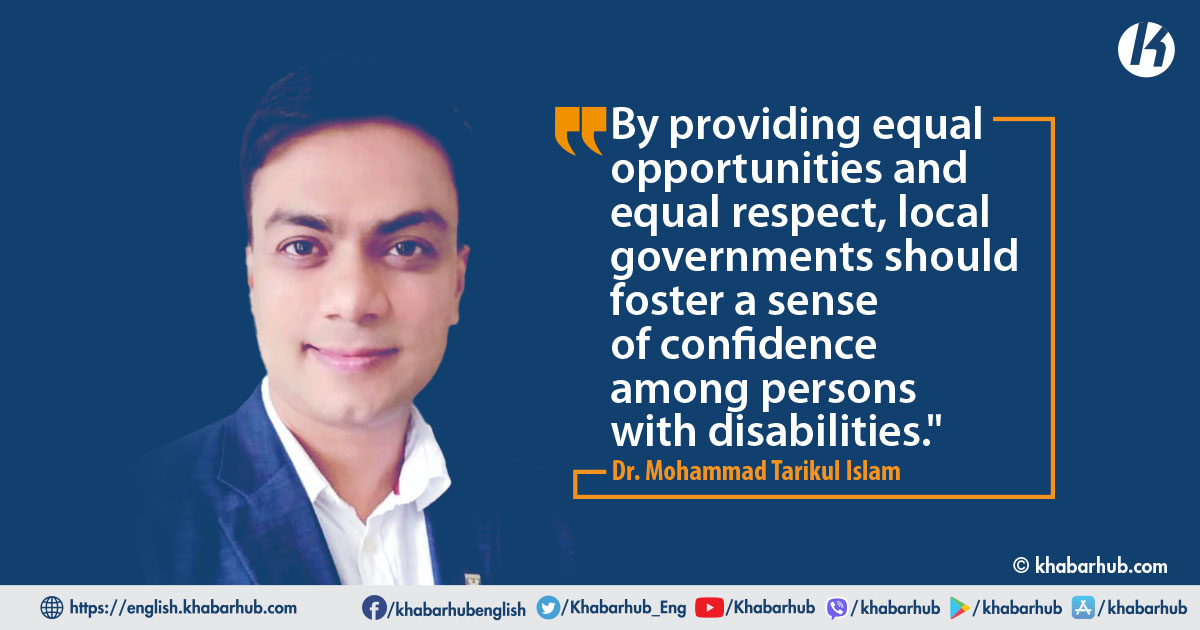According to the World Health Organization, about ten percent of Bangladesh’s total population lives with disabilities due to natural disasters, road accidents, social and family violence, malnutrition, lack of immunization and birth defects.
Negative attitudes towards social and environmental and institutional constraints are equally responsible for making them a vulnerable and neglected class.
Especially in rural areas of Bangladesh, disability is often seen as a curse. The Government of Bangladesh is committed to ensuring the rights of people with disabilities, which has been observed through the passage of the ‘Bangladesh Rights and Protection of Persons with Disabilities Act 2013’ in Parliament.
For the first time in the country, people with disabilities are being covered under health insurance so that they can get treatment at a low cost.
People with Autism, Down’s Syndrome, Intellectual Disability and Cerebral Palsy will initially be eligible for the ‘Bangabandhu Suraksha Bima for Persons with Disabilities’ policy.
Even, the current government is working to provide permanent housing and employment for the differently abled to make life safer for people with autism.
The Ministry of Social Welfare must step up its coordinating role to reach the grassroots level by engaging Union Parishads to mainstream PWDs for the sake of sustainable development.
To complement the government’s efforts, to protect their rights and privileges, several national and international organizations have also been actively advocating for the rights of persons with disabilities, organizing roundtables and conducting advocacy activities with the media.
Clearly, citizen participation has been widely used in development discussions over the past few decades. Meaningful participation of people irrespective of gender, religion and disability has been recognized as absolutely essential for development.
We are conversant with the presence of thirteen standing committees at the Union Parishad level. Unfortunately, in these committee meetings, their voices are not heard on various platforms of decision-making processes of local government bodies (for example; standing committees, ward meetings, project implementation committees, community policing committees and open budget discussions).
People with disabilities do not have the opportunity to know what kind of disaster management programs are planned and implemented by the Bangladesh Union Disaster Management Committee.
Disaster management needs to be reformed at the grassroots level to ensure the meaningful participation of persons with disabilities.
Moreover, creating social awareness campaigns to take care of disabled people during disaster management; In addition, community participation in the process of hazard risk and resource assessment, planning and preparation and implementation of mitigation solutions led to the effectiveness of the Union Disaster Management Committee.
We need to ensure that disaster management is inclusive and mainstreamed in every step from alert to recovery with the blessing of local government.
People with disabilities must be included in all standing committees of the Union Parishad and heard while taking decisions. The Standing Committee of the Union Parishad must be vocal to ensure the rights of the disabled at the grass root level.
The Standing Committee shall create awareness by informing concerned offices at the Upazila level to ensure access of disabled persons, especially women and girls with disabilities and disabled elderly persons, to social security programs and poverty alleviation programs.
The Standing Committee shall provide necessary assistance to persons with disabilities and their families living in situations of poverty to obtain assistance from the Government for disability-related expenses, including adequate training, counseling, financial assistance and interval care.
The lack of coordination between Disability Rights and Protection Committees at Upazila, district and national levels is making them ineffective and therefore the rights of persons with disabilities are not being properly implemented.
A budget shortfall should not be a reason for anyone to stay away from regular duties.
By providing equal opportunities and equal respect, local governments should foster a sense of confidence among persons with disabilities and build a sense of unity among them.
Not only the Ministry of Social Welfare, other ministries and departments including local government agencies should come forward for the welfare of the disabled. It is true that creating coordination among all the related agencies and ministries is a challenge.
The Ministry of Social Welfare must step up its coordinating role to reach the grassroots level by engaging Union Parishads to mainstream PWDs for the sake of sustainable development.
Committees should ensure that they are functioning properly, and if not, identify the difficulties and bring them to the attention of the concerned authorities.
Steps should be taken to provide necessary funds/manpower/logistical support to ensure protection or services to persons with disabilities.
National committees should be made more effective as per law. If necessary, the Union Parishad may introduce a small unit for persons with disabilities so that it can ascertain the exact number of persons with disabilities residing at the Union level as well as assess their needs.
Union Parishads should be encouraged to work to ensure access of persons with disabilities to public services, information and justice.
Inclusive development must ensure equal access to education, health care services, work and employment, and social protection, among others, for persons with disabilities, like those with disabilities.
By providing equal opportunities and equal respect, local governments should foster a sense of confidence among persons with disabilities and build a sense of unity among them.
We must remember that disabled people are our relatives, neighbors and members of society. We must remember that people with disabilities can contribute to nation-building through their innovative ideas and dedication.
(Dr. Mohammad Tarikul Islam is an Associate Professor of Government and Politics at Jahangirnagar University)









Comment